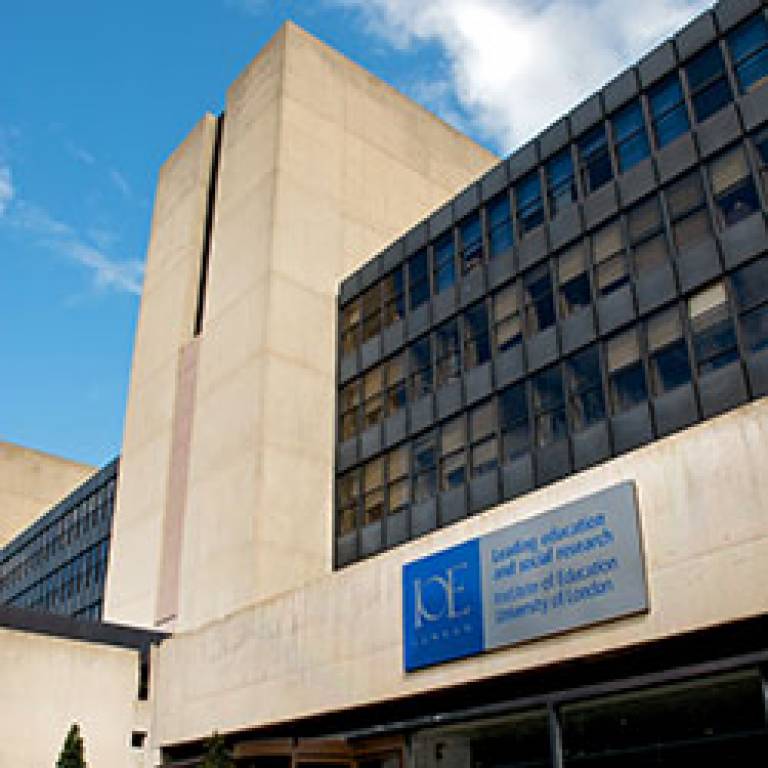Provost's View: UCL and the IOE - a shared future
13 February 2014
One of the great strengths of UCL is our restless spirit, never wanting to stand still.
 Many of you will be aware that we now have a really
substantial opportunity for innovation,
following the decisions over the past week or so of the Councils of UCL and the
Institute of Education (IOE) to enter
into negotiations regarding a move from the existing strategic partnership to a
permanent merger.
Many of you will be aware that we now have a really
substantial opportunity for innovation,
following the decisions over the past week or so of the Councils of UCL and the
Institute of Education (IOE) to enter
into negotiations regarding a move from the existing strategic partnership to a
permanent merger.
I have a huge amount of respect for the work of the IOE, a truly world-leading organisation in its field, whose strengths suggest a natural partnership with UCL. As such, I believe that the arguments in favour of a merger are extensive and compelling.
A successful partnership
Since the two institutions entered into a strategic partnership in October 2012, much has been achieved in the areas of research, teaching innovation, professional services and working with London schools.
In particular, there has been a successful joint bid for a centre for Quantitative Social Sciences (QSS) to improve teaching to undergraduate students, with a resulting grant of £1.34 million from the Nuffield Foundation, HEFCE and ESRC.
Other major research collaborations include an ESRC and College of Policing-funded partnership programme to support the new What Works Centre on Crime Reduction.
The IOE is also a partner in the new £7 million, ESRC-funded Administrative Data Research Centre for England, held jointly by UCL and the University of Southampton, which will enable information collected by government departments and other agencies, such as tax, education and health data, to be shared with researchers.
Discussions around closer working between the professional services of the two organisations have resulted in a range of developments, including the successful launch of enhanced reciprocal library borrowing rights which are already being exploited by staff and postgraduate students from both institutions.
Given our mutual desire to engage with our local communities, one of the projects with the greatest potential for impact is the London Education Excellence Alliance, a partnership between the IOE, UCL and at least five schools, which will start its activity in September 2014.
Making the case
The academic case for merger rests on what IOE and UCL can achieve together. UCL has major strengths in cognitive psychology, the IOE in developmental psychology; bringing these activities closer together would offer students a richer curriculum and extend scope for research collaboration. Equally, UCL is a major centre for medical education; the IOE has strengths in research and development in cross-professional clinical education.
For the IOE, a well-executed merger would enable significant investment in academic activity, with a genuine prospect of securing its status as the pre-eminent centre for education research and development in the world.
For UCL, it would strengthen our thinking and development about teaching and learning in higher education, offering scope for significant further enhancements in the student experience. There are also significant opportunities to develop work with London schools on extending participation in higher education, developing the scope of the UCL Academy to serve the London education community.
The IOE's work in public policy would also help it transform research in basic science into policy.
Put simply, merger of the IOE and UCL offers something neither can realise alone: the opportunity to set the agenda for education and applied social science nationally and globally for the 21st century.
In practice
Given the size of the Institute, with around 800 staff and 7,500 students, it would join UCL as a faculty of the university. The Institute of Education title would be retained for the new faculty in recognition of the fact that the IOE is a globally-recognised name and that it is in the interests of all involved that this be protected.
As with our recent merger with the School of Pharmacy, all jobs at the IOE would be guaranteed for 12 months, and in practice we do not anticipate any job losses as the proposal is driven by academic goals, not financial. It will remain in the buildings that it currently occupies following the merger.
Timetable for the merger
Now that our respective Councils have agreed to start formal negotiations on the proposed merger, UCL and the IOE will undertake a due diligence process and a consultation exercise with staff, students and other key stakeholders.
Should the negotiations be successful, our Council will then be asked to make an 'in principle' decision to merge the two organisations later this academic year. Although the next stages of the process would be complex, it's the aim of both institutions that the merger will be completed during this calendar year.
This represents a really exciting opportunity for both organisations, and for UCL supports key planks of our strategy going forward: extending our research excellence; bringing teaching and research closer together to enhance the student experience; delivering more for London and on the international stage.
I hope you share my excitement at the possibilities offered by this merger and look forward to hearing your views about how we can make the very most of this opportunity.
Professor Michael Arthur
UCL President & Provost
 Close
Close

